The baby doll market is estimated to be valued at USD 10.9 billion in 2025 and is projected to reach USD 18.0 billion by 2035, registering a compound annual growth rate (CAGR) of 5.1% over the forecast period.
From 2021 to 2025, the market grows from USD 8.5 billion to 10.9 billion, with intermediate values passing through USD 9.0 billion, 9.4 billion, 9.9 billion, and 10.4 billion. This phase reflects steady growth driven by consistent consumer demand, increasing disposable income, and the continuous appeal of baby dolls in the toy industry. The early phase of growth is supported by both traditional product categories and innovations in interactive, educational, and customizable baby dolls.
Between 2026 and 2030, values rise from USD 10.9 billion to 14.0 billion, moving through USD 11.5 billion, 12.1 billion, 12.7 billion, and 13.3 billion. This period sees higher absolute growth as premium and high-tech dolls, such as those with voice recognition and AI integration, gain popularity. Consumer preferences shift towards high-quality and multi-functional dolls that enhance play experiences. From 2031 to 2035, the market progresses from USD 14.7 billion to 18.0 billion, with intermediate values of USD 15.5 billion, 16.3 billion, and 17.1 billion.
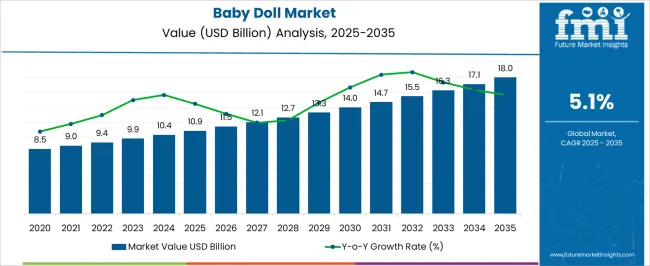
The baby doll market is influenced by five key parent markets that shape its growth, consumer trends, and demand across various sectors. The toy and game market contributes the largest share, about 28-32%, as baby dolls are a staple in children’s toys, offering developmental benefits such as social skills, nurturing behaviors, and emotional intelligence through role-playing. The gift and novelty items market adds approximately 20-24%, with baby dolls being popular choices for gifting during special occasions such as birthdays, holidays, and celebrations, particularly for young children.
The fashion and accessory market contributes around 15-18%, as collectible and custom baby dolls often come with a wide range of clothing, accessories, and fashion items, catering to both children and adult doll collectors. The e-commerce and online retail market accounts for roughly 12-15%, where the ease of purchasing baby dolls online has driven growth in global demand, especially for limited edition, custom, and specialty dolls.
Finally, the educational products market represents about 8-10%, as baby dolls are increasingly used in schools and early childhood education settings to teach concepts such as empathy, caregiving, and gender roles. Collectively, these parent markets reflect the significant role of baby dolls in child development, gifting traditions, fashion, and even education, making them a versatile and enduring product in the toy and collectibles industries.
| Metric | Value |
|---|---|
| Baby Doll Market Estimated Value in (2025 E) | USD 10.9 billion |
| Baby Doll Market Forecast Value in (2035 F) | USD 18.0 billion |
| Forecast CAGR (2025 to 2035) | 5.1% |
The baby doll market is experiencing steady expansion, influenced by evolving consumer preferences, brand innovation, and the integration of cultural and educational value into toy designs. Industry announcements and retail performance data have indicated that demand is being driven by a combination of nostalgia, collectability, and developmental play benefits. Manufacturers have diversified product offerings to include both traditional and interactive designs, catering to a wide spectrum of age groups and interests.
The rise of storytelling-driven marketing campaigns and cross-media licensing has also strengthened product visibility. Furthermore, the global growth of organized retail and e-commerce has improved access to branded dolls, allowing companies to tap into both mature and emerging markets.
Seasonal gifting trends, coupled with parental focus on safe, high-quality materials, continue to shape purchasing decisions. Over the coming years, expansion is expected to be led by strong demand for traditional dolls, steady sales in the medium price range that balances quality with affordability, and continued dominance of the female consumer group due to established buying patterns and brand targeting strategies.
The baby doll market is segmented by product type, price range, consumer group, age group, distribution channel, and geographic regions. By product type, baby doll market is divided into traditional dolls, interactive dolls, realistic/reborn dolls, fashion dolls, soft/plush dolls, and others. In terms of price range, baby doll market is classified into medium (USD 20 - USD 50), low (under USD 20), and high (above USD 50). Based on consumer group, baby doll market is segmented into female and male. By age group, baby doll market is segmented into 4 - 6 years, Upto 12 months, 1 - 2 years, 2 - 4 years, 6 - 8 years, 8 - 10 years, 10 - 12 years, and above 12 years. By distribution channel, baby doll market is segmented into online and offline. Regionally, the baby doll industry is classified into North America, Latin America, Western Europe, Eastern Europe, Balkan & Baltic Countries, Russia & Belarus, Central Asia, East Asia, South Asia & Pacific, and the Middle East & Africa.
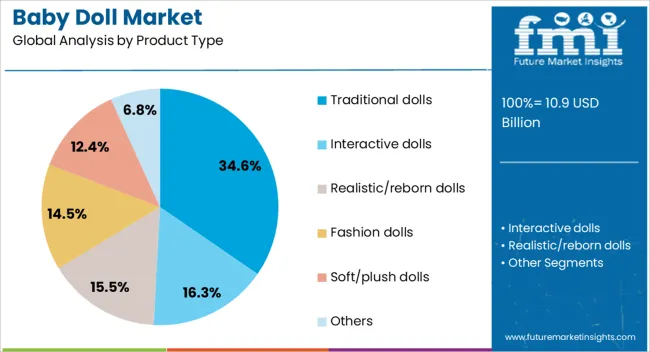
The traditional dolls segment is projected to account for 34.6% of the baby doll market revenue in 2025, reflecting consistent consumer interest in classic toy formats. This segment’s resilience has been supported by its enduring appeal across generations, driven by familiarity, cultural significance, and collectible value.
Toy industry reviews have highlighted that traditional dolls often serve as a foundation for role-play and imaginative storytelling, fostering emotional attachment among children. Manufacturers have maintained market relevance by improving material quality, safety standards, and aesthetic detailing, while also reintroducing heritage-inspired designs.
The popularity of traditional dolls has been reinforced through multi-channel retail presence and seasonal promotions. As gifting occasions and parental preference for long-lasting, timeless toys remain strong, the traditional dolls segment is expected to retain its market share despite the rising popularity of interactive and technology-driven toys.
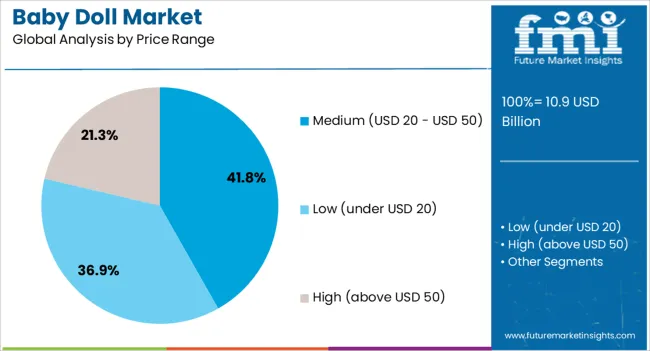
The medium price range segment, valued between USD 20 and USD 50, is projected to contribute 41.8% of the baby doll market revenue in 2025, positioning itself as the leading price tier. This range offers a balance between affordability and enhanced product quality, attracting both budget-conscious and value-seeking consumers.
Retail analytics have shown that medium-priced dolls often incorporate superior craftsmanship, better materials, and added accessories compared to lower-priced alternatives, making them appealing for gifting and special purchases. Brands have strategically positioned their most popular product lines within this range to capture mass-market appeal while maintaining profitability.
Additionally, mid-range products often feature licensed characters and themed collections, boosting desirability among both children and collectors. This price segment’s consistent sales performance is supported by broad distribution across physical retail stores and online marketplaces, ensuring accessibility to a diverse consumer base.
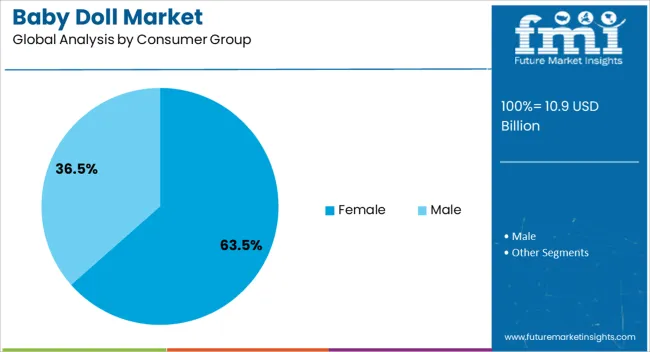
The female consumer group is projected to hold 63.5% of the baby doll market revenue in 2025, continuing to represent the primary target demographic. This dominance has been shaped by historical market positioning, product themes, and social play patterns that traditionally associate dolls with female-oriented play.
Marketing campaigns, brand storytelling, and licensed product lines have frequently been designed to appeal to female children, reinforcing their purchasing influence in this category. Retail sales data has shown higher frequency of doll purchases within households with female children, particularly during festive and gifting seasons.
Additionally, product diversification within this consumer group ranging from baby care role-play dolls to fashion-themed collections—has further entrenched brand loyalty. While gender-neutral marketing trends are emerging, the female consumer group remains the largest and most engaged segment in the baby doll market, ensuring its continued leadership in revenue contribution.
Dolls with smart features such as voice commands, motion sensors, and educational content are gaining popularity. However, challenges such as high production costs, material sourcing, and competitive pricing pressure exist. Opportunities lie in offering customizable dolls, sustainable materials, and improved cultural representation. Technological integration, such as smart dolls with AR/VR elements, is a key trend shaping the market. Manufacturers focused on inclusivity, eco-friendliness, and personalized play experiences are well-positioned to thrive in the growing global market.
The baby doll market is experiencing significant growth, driven by the rising demand for interactive and educational dolls that encourage developmental learning. Consumers, particularly parents, are increasingly seeking dolls that mimic real-life features and offer features like voice commands, movements, and educational content. These dolls promote role play, empathy, and motor skills development in young children. Leading brands such as Mattel, Hasbro, and MGA Entertainment are focusing on creating dolls with advanced interactive functions, such as speaking, singing, or even responding to commands. The demand for customizable and diverse doll offerings, catering to various cultural and physical representations, also contributes to market growth globally.
Despite growing demand, the baby doll market faces challenges related to production costs, competitive pressure, and material sourcing. The development of highly interactive dolls with advanced features such as voice recognition and motion sensors requires significant investment in research, development, and high-quality materials. As the market is highly competitive, with numerous global and local players, pricing strategies are critical. Additionally, the high cost of materials for advanced dolls can limit affordability for some consumers. Companies must manage production costs while ensuring product quality and maintaining profit margins. Manufacturers focusing on cost-effective production without compromising quality are best positioned to thrive.
Consumers increasingly prefer dolls that reflect diversity, offering options with various skin tones, hair textures, and clothing styles. Sustainable and eco-friendly dolls made from biodegradable materials or recycled plastic are gaining popularity as consumers become more environmentally conscious. Furthermore, the increasing trend of personalized dolls, where customers can create unique dolls based on their preferences or their child’s characteristics, is expected to fuel demand. Manufacturers offering dolls that align with these trends, such as promoting inclusivity and sustainability, are poised for success.
Technological integration is a key trend in the baby doll market, with smart dolls offering interactive features like voice commands, sensors, and connectivity with mobile apps. These dolls engage children in unique ways by responding to their actions and encouraging learning. Personalization trends also continue to gain momentum, with customized dolls designed to reflect the preferences and identities of individual children. In addition, dolls with augmented reality (AR) and virtual reality (VR) elements are making their way into the market. Companies that combine technology, personalization, and educational content are likely to capture the attention of modern parents looking for advanced play experiences for their children.
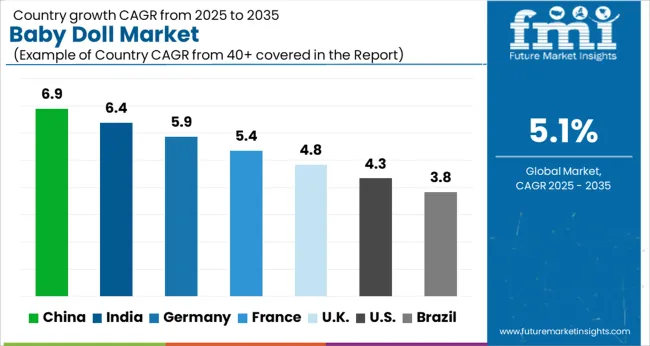
| Country | CAGR |
|---|---|
| China | 6.9% |
| India | 6.4% |
| Germany | 5.9% |
| France | 5.4% |
| UK | 4.8% |
| USA | 4.3% |
| Brazil | 3.8% |
Global demand for baby dolls is projected to rise at a 5.1% CAGR from 2025 to 2035. Among the five profiled markets, China leads at 6.9%, followed by India at 6.4% and Germany at 5.9%, while the UK posts 4.8% and the USA records 4.3%. These rates translate to a growth premium of +35% for China, +26% for India, and +16% for Germany versus the baseline, whereas the UK and the USA trail by –6% and –15%, respectively. The divergence reflects local catalysts: increasing demand from the growing middle class in China and India, innovations in doll designs in Germany, and stable demand driven by brand loyalty and established markets in the UK and USA The analysis includes over 40+ countries, with the leading markets detailed below.
The baby doll market in China is projected to grow at a CAGR of 6.9% from 2025 to 2035. The growth is primarily driven by the expanding middle class, increased disposable income, and rising demand for high-quality toys. The growing popularity of educational toys and the shift towards premium products contribute significantly to the market expansion. China’s large consumer base and rapid urbanization provide a solid foundation for baby doll sales, with both domestic and international brands tapping into the market. The increasing influence of social media and digital marketing has further amplified the demand, particularly for innovative and interactive dolls. The growing preference for dolls that incorporate educational and emotional development aspects is also a major driver.
The baby doll market in India is expected to expand at a CAGR of 6.4% from 2025 to 2035. The increasing popularity of dolls as a toy for children, especially in urban areas, is driving the market. With the country’s expanding middle class and rising disposable income, there is an increasing demand for a variety of toys, including baby dolls. Additionally, growing awareness of educational toys, which help in the emotional and cognitive development of children, is contributing to the rise in baby doll sales. The market is also influenced by the increasing trend of online shopping and the availability of a wide variety of dolls at different price point
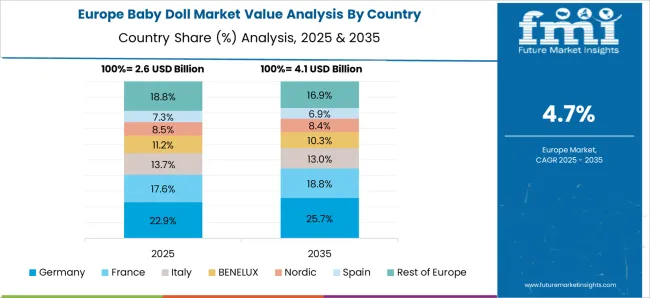
The baby doll market in Germany is projected to grow at a CAGR of 5.9% from 2025 to 2035. The demand for baby dolls in Germany is driven by consumers’ preference for high-quality, safe, and eco-friendly products. The German market has seen increasing interest in dolls that offer educational value, such as those that enhance emotional intelligence and foster creativity in children. Furthermore, gender-neutral dolls and those reflecting cultural diversity are gaining traction, aligning with Germany’s focus on inclusivity. Consumers are also looking for multifunctional dolls that integrate modern features, such as those that can speak or move, which enhances their appeal. The German toy market is supported by a robust retail network, both online and offline, making baby dolls more accessible.
The UK baby doll market is expected to grow at a CAGR of 4.8% from 2025 to 2035. The demand for baby dolls in the UK is stable, driven by a preference for premium products from well-known brands. As consumers become more focused on educational and developmental toys, baby dolls that promote emotional intelligence and creativity are becoming increasingly popular. The market is also influenced by an increased demand for interactive dolls that provide an engaging experience for children. Online shopping is gaining momentum in the UK, enabling easy access to a wide variety of baby dolls from both local and international brands. the trend of gifting high-quality toys, particularly around holidays like Christmas, is another significant contributor to demand.
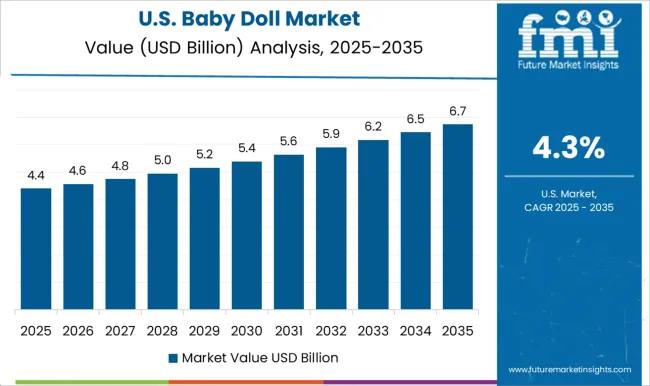
The USA baby doll market is projected to grow at a CAGR of 4.3% from 2025 to 2035. Despite slower growth projections, the USA remains a significant market for baby dolls, driven by the demand for high-quality and branded toys. American consumers increasingly prefer dolls that foster emotional development, as well as those with interactive features like movement, sound, and programmable functions. The demand for dolls that reflect diversity and inclusivity is also on the rise, as parents seek toys that help teach children about different cultures and backgrounds. The growth of online shopping platforms has made baby dolls more accessible to a wider audience, allowing parents to explore a variety of options. Consumer loyalty to established doll brands and an increased focus on educational play continue to drive the market, ensuring steady demand.
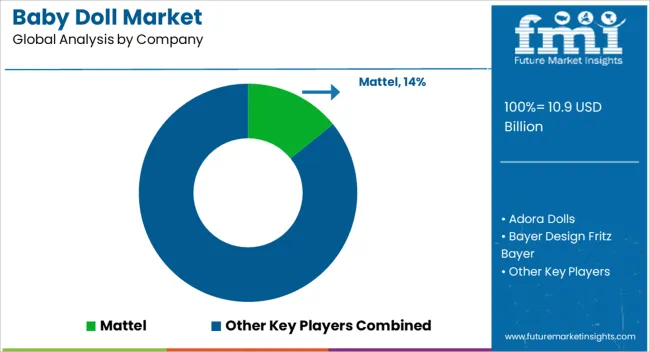
The baby doll market is highly competitive, with major brands such as Mattel, Adora Dolls, Bayer Design Fritz Bayer, Cabbage Patch Kids, Corolle, Gotz Puppenmanufaktur, Hasbro, JC Toys Group, MGA Zapf Creation, The New York Doll Collection, Toy Land, and Toymagic dominating the sector. Mattel leads the market with its iconic Barbie brand, offering a wide range of baby dolls, including interactive and lifelike options. Its product brochures emphasize features like customizable outfits, diverse doll designs, and various accessories, targeting a broad consumer base from young children to collectors. Adora Dolls and Bayer Design Fritz Bayer cater to the high-end segment, offering dolls with soft bodies, realistic facial features, and premium outfits.
Their brochures highlight the craftsmanship, collectability, and unique design of each doll, positioning them as luxury items for both play and display. Cabbage Patch Kids, known for their signature look, have maintained a strong presence in the market by emphasizing nostalgia and exclusivity. Their product brochures emphasize the uniqueness of each doll, highlighting its individual birth certificate and adoption papers, appealing to both children and collectors alike. Corolle and Gotz Puppenmanufaktur focus on offering lifelike baby dolls with soft vinyl bodies and realistic features. Their brochures emphasize the quality of materials, attention to detail, and a variety of interactive features, such as dolls that can cry, eat, or sleep.
Hasbro and JC Toys Group offer more affordable options with a wide range of baby dolls that appeal to mass-market consumers. Their product brochures emphasize fun and creativity, with dolls designed to encourage imaginative play and social interaction. MGA Zapf Creation, The New York Doll Collection, Toy Land, and Toymagic target niche segments by offering dolls with specific themes, such as fashion dolls, ethnic diversity, and educational features. Their brochures focus on unique play patterns, educational value, and customization options. The competition in the baby doll market is driven by product quality, brand recognition, and the ability to meet diverse customer preferences, with brochures playing a central role in highlighting these attributes.
| Item | Value |
|---|---|
| Quantitative Units | USD 10.9 billion |
| Product Type | Traditional dolls, Interactive dolls, Realistic/reborn dolls, Fashion dolls, Soft/plush dolls, and Others |
| Price Range | Medium (USD 20 - USD 50), Low (under USD 20), and High (above USD 50) |
| Consumer Group | Female and Male |
| Age Group | 4 - 6 years, Upto 12 months, 1 - 2 years, 2 - 4 years, 6 - 8 years, 8 - 10 years, 10 - 12 years, and Above 12 years |
| Distribution Channel | Online and Offline |
| Regions Covered | North America, Europe, Asia-Pacific, Latin America, Middle East & Africa |
| Country Covered | United States, Canada, Germany, France, United Kingdom, China, Japan, India, Brazil, South Africa |
| Key Companies Profiled | Mattel, Adora Dolls, Bayer Design Fritz Bayer, Cabbage Patch Kids, Corolle, Gotz Puppenmanufaktur, Hasbro, JC Toys Group, MGA Zapf Creation, The New York Doll Collection, Toy Land, and Toymagic |
| Additional Attributes | Dollar sales by product type (interactive dolls, soft dolls, collectible dolls, playsets), material type (plastic, fabric, mixed media), and target age group (infants, toddlers, collectors). Demand is influenced by the growing trend of educational and interactive toys, along with increasing consumer preference for high-quality, realistic dolls. Regional trends show strong growth in North America, Europe, and Asia-Pacific, driven by increasing disposable incomes, awareness of child development, and expanding e-commerce platforms. |
The global baby doll market is estimated to be valued at USD 10.9 billion in 2025.
The market size for the baby doll market is projected to reach USD 18.0 billion by 2035.
The baby doll market is expected to grow at a 5.1% CAGR between 2025 and 2035.
The key product types in baby doll market are traditional dolls, interactive dolls, realistic/reborn dolls, fashion dolls, soft/plush dolls and others.
In terms of price range, medium (usd 20 - usd 50) segment to command 41.8% share in the baby doll market in 2025.






Full Research Suite comprises of:
Market outlook & trends analysis
Interviews & case studies
Strategic recommendations
Vendor profiles & capabilities analysis
5-year forecasts
8 regions and 60+ country-level data splits
Market segment data splits
12 months of continuous data updates
DELIVERED AS:
PDF EXCEL ONLINE
Baby Car Safety Seat Market Forecast and Outlook 2025 to 2035
Baby Bath and Shower Products Market Size and Share Forecast Outlook 2025 to 2035
Baby & Toddler Carriers & Accessories Market Size and Share Forecast Outlook 2025 to 2035
Baby Shoes Market Size and Share Forecast Outlook 2025 to 2035
Baby Oral Care Market Size and Share Forecast Outlook 2025 to 2035
Baby Ear Thermometer Market Size and Share Forecast Outlook 2025 to 2035
Baby Food Dispensing Spoon Market Size and Share Forecast Outlook 2025 to 2035
Baby Pacifier Thermometer Market Size and Share Forecast Outlook 2025 to 2035
Baby Crib Sheet Market Size and Share Forecast Outlook 2025 to 2035
Baby Teeth Care Products Market Size and Share Forecast Outlook 2025 to 2035
Baby Food Market Analysis - Size, Share, and Forecast Outlook 2025 to 2035
Baby Diaper Market Growth, Forecast, and Trend Analysis 2025 to 2035
Baby Powder Market - Size, Share, and Forecast 2025 to 2035
Baby Sling Market Size and Share Forecast Outlook 2025 to 2035
Baby Bottle Holder Market Size and Share Forecast Outlook 2025 to 2035
Baby Toddler Bar Market Analysis - Size, Share, and Forecast Outlook 2025 to 2035
Baby Snacks Market Analysis - Size, Share, & Forecast Outlook 2025 to 2035
Baby Oil Market Analysis - Size, Share, and Forecast Outlook 2025 to 2035
Baby Food Packaging Market Analysis - Size, Share, and Forecast Outlook 2025 to 2035
Baby Milk Market Analysis - Size, Share, & Forecast Outlook 2025 to 2035

Thank you!
You will receive an email from our Business Development Manager. Please be sure to check your SPAM/JUNK folder too.
Chat With
MaRIA